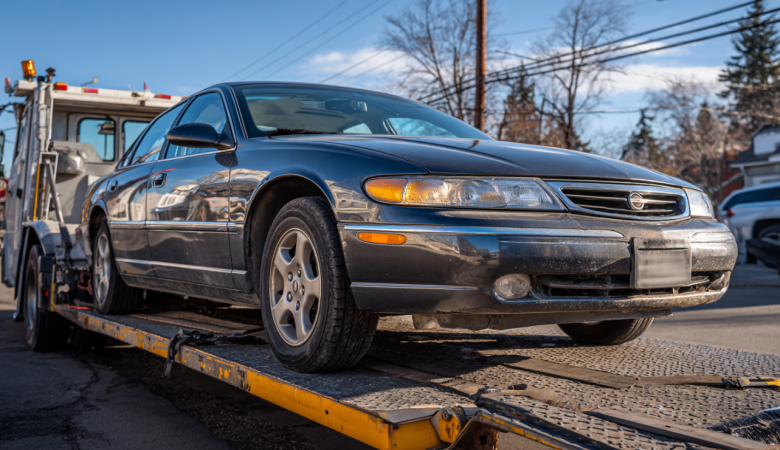When you’re dealing with a salvage vehicle, getting it from one place to another isn’t as simple as driving it yourself. Whether the car has been damaged in an accident or it’s a repairable project vehicle you bought from an auction, you’ll likely need to use a car transport company. But with so many shipping options and price points, how do you know what’s right for your needs?
At EasyHaul, we help thousands of customers in the United States move vehicles every year, many of them salvage cars. This guide breaks down the most important factors to help you choose the best method for shipping your vehicle safely, quickly, and at a fair price, so you can benefit from low-cost car shipping without the risk.
1. Understand Your Salvage Vehicle’s Condition
The first step in choosing a shipping method is to evaluate your salvage car. Ask yourself:
- Can it roll, brake, and steer?
- Does it run?
- Is the damage purely cosmetic, or are there structural issues?
If your car can’t roll or brake, special equipment may be needed during loading and unloading, which could raise the car shipping cost. Inoperable cars often require winch assistance or a forklift, depending on the transport method. Knowing your car’s condition in advance will save you time and money and help you get more accurate car shipping quotes when transporting your vehicle.
2. Open vs. Enclosed Car Shipping
When you start exploring your options for transporting your car, you’ll need to decide between open and enclosed transport.
Open transport is the most commonly used option. Your vehicle is shipped on a trailer that’s open to the weather and road debris. It’s cost-effective and widely available. Most customers choose this option when they’re looking for affordable car shipping or when the car is the type of vehicle that doesn’t need extra protection.
Enclosed car shipping places your vehicle inside a covered trailer. This is an ideal transportation option for high-value cars, collector cars, or salvage vehicles with exposed interiors or sensitive parts. Enclosed auto shipping protects the car from rain, snow, dirt, and debris. It’s more expensive, but in many cases, it’s worth the cost for peace of mind.
If you’re still deciding between open and enclosed transport, ask yourself how much protection your salvage car needs and what your budget allows. While enclosed car transport offers better protection, open trailers are often the cheapest way to ship a salvage vehicle.
3. Door-to-Door vs. Terminal-to-Terminal
Most car shipping companies offer a door-to-door service, where the driver picks up and drops off your car at addresses you provide. This is the most convenient option and is especially helpful if your salvage car can’t be driven.
Some companies offer terminal-to-terminal shipping, where you drop off and pick up your vehicle at a regional transport hub. While this may reduce the shipping cost, it’s less convenient, especially if the vehicle is inoperable or you live far from the nearest terminal.
In most cases, customers choose door-to-door service for the added convenience and ease of communication during pickup and delivery.
4. Distance and Pickup Location
How far you need to ship cars and the route the truck needs to take are key factors that impact the car shipping cost. For example, trying to ship a car across the country will naturally cost more than transporting your car a few hundred miles. However, long-distance moves sometimes offer a better rate per mile.
Your pickup and delivery location is also important. Urban areas with more carriers and routes usually have lower car shipping prices. Rural or remote areas may have fewer carriers available, which can raise the price or lead to longer wait times.
If you’re shipping a salvage vehicle from an auction yard, be sure to provide exact pickup instructions, including any release documents the carrier may need.
5. Timing and Flexibility
When you need your salvage car to arrive can affect both the price and the availability of carriers. If you need fast delivery or have a tight deadline, expect to pay more. Flexible scheduling usually allows for better shipping prices.
Some customers plan ahead and ship during off-peak seasons. Summer is typically a busy time for car transport companies, so rates go up. Shipping in the fall or winter may offer better deals.
6. How Expensive Is It to Ship a Car?
Many people ask, “How expensive is it to ship a car?” The truth is that car shipping costs vary based on a few factors:
- Distance: Longer routes cost more in total, but less per mile.
- Vehicle condition: Inoperable cars may cost more to load and secure.
- Trailer type: Enclosed transport is more expensive than open.
- Route popularity: Less common routes may cost more.
- Timing: Faster shipping or short notice can raise the cost.
To estimate the cost of shipping a car, use tools like a car shipping cost calculator or a car shipping cost estimator. These tools help you compare real-time rates and services based on your unique needs.
7. Using a Car Shipping Cost Estimator
An accurate car shipping cost estimator can help you budget and avoid surprises. These tools ask for details like:
- Vehicle year, make, and model
- Operational status
- Pickup and delivery zip codes
- Preferred shipping date
- Open or enclosed transport
Based on this information, you’ll get an estimate of your car shipping costs. Remember, this is just a starting point. Final prices may vary based on carrier availability and changing fuel prices.
8. Compare Auto Transportation Companies
Don’t settle for the first company you find online. Always compare multiple auto transportation company options. Look for:
- Experience with salvage vehicles
- Transparent pricing and policies
- Clear communication
- Verified customer reviews
The best car shipping company will offer fair pricing, a variety of services, and honest guidance. Make sure to ask about insurance coverage too, as salvage vehicles still need protection in case of accidents or delays.
9. Watch Out for Hidden Fees
Some companies advertise low base rates but tack on extra charges later. Common add-ons include:
- Inoperable vehicle fees
- Residential pickup fees
- Insurance upgrades
- Fuel surcharges
Ask for a full breakdown of your quote. Make sure your car shipping quote includes everything, from the type of trailer used to the estimated delivery time.
10. Consider Enclosed Car Shipping Services
If your salvage vehicle is a rare or expensive model, or if it’s missing windows, doors, or a roof, enclosed car shipping services are likely your best bet. Salvage cars with open interiors can be damaged further during transport if not covered properly.
Many customers ask if car shipping enclosed services are worth the added cost. For high-value or exposed vehicles, the answer is often yes. Enclosed car shipping can make a major difference in keeping your vehicle secure.
11. Use a Shipping Cost Calculator
If you want a clearer view of your shipping options, try using a car shipping cost calculator. This tool will help you:
- Understand the average car shipping cost in your area
- Compare open vs. enclosed pricing
- Evaluate different transport methods
- Budget effectively for transporting cars
When you’re comparing quotes, remember that the cheapest car shipping option isn’t always the best. You want a balance of price, reliability, and service quality.
12. Get a Quote and Book Early
It’s a good idea to book your transport at least one to two weeks ahead of time. This gives you the best chance of getting a spot with your preferred company and keeps the cost of shipping lower.
Be ready to provide all the information the carrier needs, including:
- The vehicle’s exact location
- Auction lot number (if applicable)
- Release documents
- Condition of the vehicle
The earlier you book, the more options you’ll have for both pickup dates and transport methods.
13. Summary: Choose the Right Shipping Option for You
To sum it all up, selecting the best shipping method for your salvage vehicle means understanding your car’s needs, your budget, and your priorities.
If you’re asking how much does it cost to ship a car, the answer will depend on:
- The distance and route
- Whether you choose open or enclosed transport
- Your pickup and delivery flexibility
- The car’s condition
- The service provider you select
If you’re planning to ship my car to another state, be sure to compare options and gather quotes. Use online tools like a car shipping cost calculator, read reviews of the best car shipping companies, and talk to an experienced auto transport company.
At EasyHaul, we specialize in helping customers move salvage vehicles with care and professionalism. Whether you need enclosed car transportation or a budget-friendly option, we’re here to help make the process smooth and worry-free.
Need help shipping your vehicle?
Get in touch with EasyHaul today for a fast, free quote and expert support from one of the best car shipping companies in the business. We’ll help you move your car safely, no matter its condition, distance, or destination.






Leave a Reply
You must be logged in to post a comment.